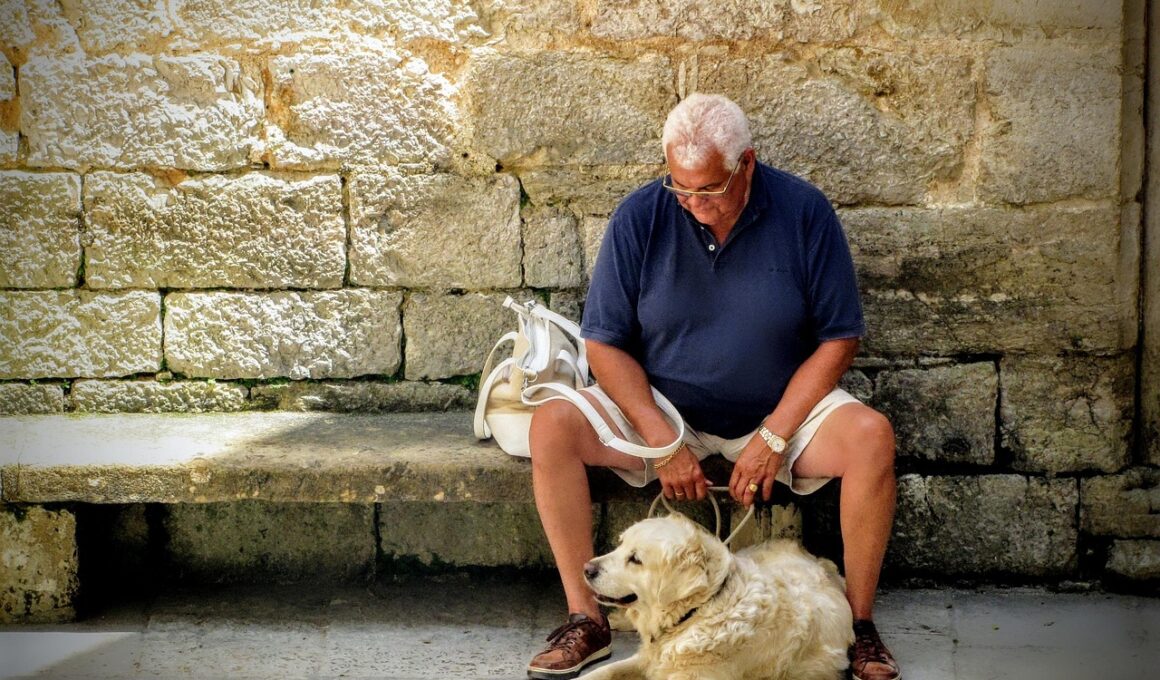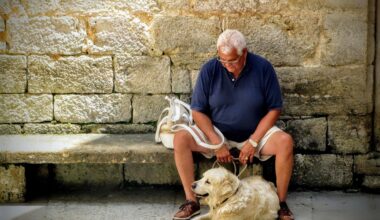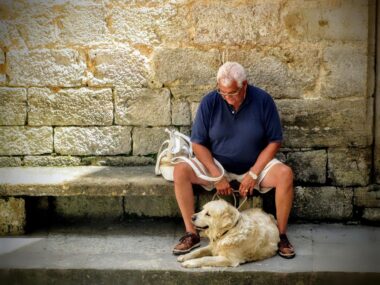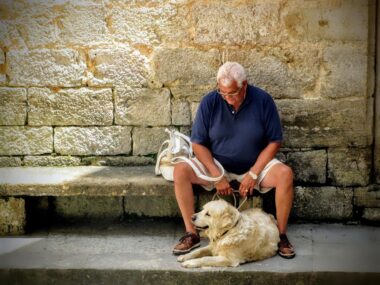Building Confidence in Older Dogs Through Social Interaction
Socializing older dogs is crucial for their emotional well-being. While puppies often engage in socialization through play, it is essential for older dogs to have positive experiences with other canines and people. Doing this can significantly enhance their confidence and reduce anxiety. Socialization can contribute to good behavior, making dogs more approachable and enjoyable companions. Different techniques can foster social skills in older dogs. For instance, introducing them to new environments gradually may help ease their apprehension. It is also helpful to let them interact with other well-behaved dogs. Ensure that these encounters are monitored and controlled to promote a sense of security. Furthermore, engaging your dog in group classes can be valuable in improving their social skills. The comfort level of your dog is paramount; thus, always observe their body language. Are they relaxed and eager? Or are they anxious? A senior dog’s history may influence their socialization responses, so it is essential to consider that. Facilitating socialization for older dogs can additionally become a fun, rewarding experience for both the owner and pet, strengthening the bond they share.
The process of socializing older dogs can be gradual yet rewarding. Consistency is key when introducing new people and pets to your dog. Start with controlled exposure to social environments, such as quiet parks or neighborhoods. Aim for interactions where your dog feels safe, building their comfort level over time. Introduce positive reinforcement with treats and praise as your dog interacts well. For instance, rewarding calm behavior when meeting new dogs reinforces positive associations. It’s vital to be patient during this period as every senior dog has its individual pace for adjusting to new situations. Establishing a routine of social interactions ensures that your dog will look forward to these engagements. Involving your dog in playdates with familiar dogs can also enhance their confidence. Remember that apprehensive older dogs may benefit from companionship with younger or calmer dogs. These interactions may serve as excellent behavioral models, enabling your older dog to learn while feeling secure. Positive experiences often lead to long-lasting behavioral changes. Make sure your older dog has frequent opportunities to socialize, as it can lead to improved behaviors and a higher overall quality of life.
Understanding Your Dog’s Behavior
Understanding your older dog’s behavior during socialization is crucial to improving their comfort levels. Observing your dog’s reactions can help you tailor your socialization approach specifically to their needs. Signs of discomfort may include growling, stiff body language, or excessive panting. If you notice these behaviors, give your dog space and remove them from the situation to prevent stress. Conversely, a relaxed posture, wagging tail, and friendly barking indicate readiness to engage. It’s important to teach your dog to tolerate novel experiences gently. Introduce new sights, sounds, and smells in a controlled manner to avoid overwhelming them. Keep sessions short and frequent rather than long and intensive. Eventually, positive experiences with socialization will help build a trusting relationship. Encourage calm interactions by meeting friends and family who can exhibit reassuring energy around your dog. Prioritize positive environments that are free from loud noises and distractions to ease anxiety. You can connect with trainers who specialize in canine behavior if needed, ensuring effective support throughout the process. These strategies will undoubtedly enrich your dog’s life, fostering happiness and social interaction.
Enriching your dog’s environment can enhance the socialization journey tremendously. Various activities can contribute to build confidence in older dogs. Daily walks in different neighborhoods can introduce your dog to new scents and sights. Visits to local pet stores or dog-friendly cafes allow interaction with other dogs in a low-pressure environment. Engaging in play sessions with toys can also awaken playful instincts, helping older dogs showcase their personalities. Participating in obedience or trick-training classes offers an excellent opportunity for social engagement while learning valuable skills. Finding friendly and patient trainers can help your dog feel more at ease as they interact with others. Consider arranging backyard playdates to facilitate familiar environments and positive experiences. Interaction with varied dog types opens your older dog to appreciate diversity in dog behavior. Each successful socialization experience contributes to building a positive foundation. Pay attention to your dog’s individual needs and modify activities based on comfort levels. The more diverse their exposures, the better adjusted they may become. By nurturing their social abilities, you ensure a happy, well-rounded canine companion who enjoys life’s adventures.
Technology in Dog Socialization
Utilizing technology can also aid in socializing older dogs effectively. For instance, pet-friendly apps and websites can connect you with local pet owners or organize playdates. Group walks arranged via forums or social media platforms provide further opportunities for your dog to engage socially. Additionally, video calls can help your dog become familiar with new people. By letting them see interactions remotely, they may find it less intimidating when they meet those individuals in person later on. Some smart gadgets also allow pet owners to monitor their dogs during playdates. Cameras enable you to observe their body language and behaviors in real-time, ensuring they remain comfortable and happy. Technology like anxiety-reducing devices can help transition older dogs into social environments, maintaining a calmer mindset. Monitor their interactions through video feeds to gain insights into their behavior while enjoying their outings. Finding solutions to socialization issues is attainable through creative means. Build a support system of fellow dog lovers through technology. This way, you are paving the way for a smoother, more enjoyable socialization process for your cherished older dog.
Rewards play a significant role in encouraging social behavior in older dogs. Positive reinforcement is vital in shaping how your dog perceives social situations. Whenever they engage positively with other dogs or people, immediately reward them with treats, toys, or affection. This creates a positive association with social experiences, making them more inclined to repeat such behaviors. It’s also wise to prepare several favorite treats to maintain their attention and enthusiasm during social encounters. Remember not to overwhelm your dog with multiple stimuli at once. Gradual socialization based on a dog’s specific response can create a well-adjusted canine companion. Engaging with obedience commands can strengthen your dog’s focus within social settings. Sit and stay commands can be practiced during interactions, reinforcing desired behavior. Ensure your older dog feels appreciated throughout the process. Striking the right balance between social encounters and calm environments is vital for their mental health. Combine engaging activities with relaxation periods to avoid any unnecessary stress. Every successful interaction will contribute to enhancing your dog’s social confidence and overall quality of life. The more positive experiences they gain, the stronger their confidence becomes.
Finally, remember that patience and understanding are vital when socializing older dogs. Every dog is different, and their past experiences may significantly affect their approach to social interactions. As a responsible pet owner, you must acknowledge your dog’s individual journey, approaching socialization at their own pace. Celebrate small victories, as they will lead to greater outcomes. Outdoor socialization opportunities should feel stress-free and fulfilling instead of overwhelming. Mixing social events with familiar and new activities can introduce novelty into their routine without instilling fear. You may consider local training workshops designed for seniors, as these create supportive environments for older dogs to thrive. Additionally, developing a consistent routine related to social engagements aids in their comfort. Dogs thrive in familiarity, so establishing a predictable schedule may ease anxiety levels. Support from fellow dog owners and trainers can foster healthier social interactions. With dedication and love, your older dog will not only gain confidence through socialization but will also become a more enjoyable, integral part of your life. Nurturing their social skills will provide them with unforgettable experiences that promote happiness and well-being.
Socialization is an ongoing process, transcending age boundaries. As you focus on socializing your older dog, acknowledge the importance of their growth, ensuring happy moments.





